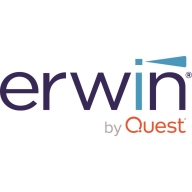

IDERA ER/Studio and erwin Data Modeler by Quest are leading solutions in the data modeling software sector. While both have unique strengths, IDERA's dynamic modeling and reverse engineering capabilities seem to offer a competitive edge for complex project requirements.
Features: IDERA ER/Studio impresses with its strong reverse engineering capabilities, allowing users to examine undocumented legacy databases and create dynamic models through domain definitions and macros. Its comprehensive graphic and formatting solutions facilitate efficient collaboration via a centralized repository. On the other hand, erwin Data Modeler simplifies the transition from logical to physical models, offering precise DDL generation. Its visual data complexities handling and adaptability in showcasing data models are highly valued for overcoming complexities in data sources.
Room for Improvement: IDERA ER/Studio faces challenges such as complex deployment and licensing processes, limited entity display capabilities, and performance issues with large databases. The documentation provided can be improved to assist with these challenges. Erwin struggles with a less intuitive user interface and syncing large models. It has limitations in handling NoSQL databases and its licensing processes can be problematic. Both solutions could benefit from enhanced error handling and optimization across diverse database platforms.
Ease of Deployment and Customer Service: IDERA ER/Studio supports both on-premises and public cloud deployments, garnering commendable feedback for ease of use post-licensing, though premium tiers are suggested for optimal technical support. Meanwhile, erwin is more centered on on-premises deployment, which can result in slower response times from geographically distant support teams, even though customer service remains satisfactory overall.
Pricing and ROI: IDERA ER/Studio is noted for its high initial cost, yet users find its features worthwhile, suggesting the need for more flexible licensing options. Its ROI is positive, especially for organizations that leverage its full suite of capabilities. Erwin Data Modeler is expensive but offers a structured licensing approach, including concurrent licensing for broader team access. The perceived cost-effectiveness balances with its robust functionalities, though regional economic differences may present pricing challenges. Both products achieve high user satisfaction regarding the value they deliver relative to their pricing models.
It replaces manual charting in Visio with a structured tool, providing significant return on investment.
Quest is committed to keeping the product robust.
There is plenty of documentation available online for assistance, making it straightforward to address any issues.
I would rate it probably a nine, making it a leader in data modeling.
It scales well to teams of one hundred plus people.
New versions often introduce enhanced features but may cause model crashes due to memory exhaustion.
Erwin is a very stable product.
Both Erwin and ER/Studio do not have AI or machine learning features for automation.
The setup cost may have been around $1500 to $2000.
In terms of pricing, ER/Studio is slightly more expensive compared to Erwin, by about five to ten percent.
Transitioning from a logical to a physical environment with just a switch is key.
When we built an application, it facilitated the development process by providing the skeleton of the application and the foundation for functions.
It has strong versioning support and can even integrate with third-party versioning tools like GitHub.


erwin pioneered data modeling, and erwin Data Modeler (erwin DM) remains trusted, award-winning software for data modeling and database design, automating complex and time-consuming tasks. Use it to discover and document any data from anywhere for consistency, clarity and artifact reuse across large-scale data integration, master data management, metadata management, Big Data, business intelligence and analytics initiatives – all while supporting data governance and intelligence efforts.
IDERA ER/Studio is a powerful suite for business-driven data modeling that enables companies to create an enterprise architecture foundation for data governance. With round-trip support for multiple database platforms, data architects have the power to reverse-engineer, analyze, and optimize existing databases easily from diverse platforms. Data professionals can easily capture and share models, metadata, data sources, and glossaries across the organization for improved alignment between the organization and Information Technology. Organizational stakeholders can take part in the metadata definition workflow and access information on models and metadata at the right level for their needs.
Unlike its competition, it provides the broadest range of data platform support, industry-leading enterprise-level capabilities, visual data lineage and flow modeling, full dimensional modeling for data warehousing and business intelligence, and business data objects to bridge the gap between developers and data architects. It also provides a complete solution for enterprise architecture and data governance, extensive model change management, unique incorporation of true enterprise data dictionaries, unique linking of constructs across models, integrated visual data lineage import, and integrated data and business process modeling.
We monitor all Enterprise Architecture Management reviews to prevent fraudulent reviews and keep review quality high. We do not post reviews by company employees or direct competitors. We validate each review for authenticity via cross-reference with LinkedIn, and personal follow-up with the reviewer when necessary.